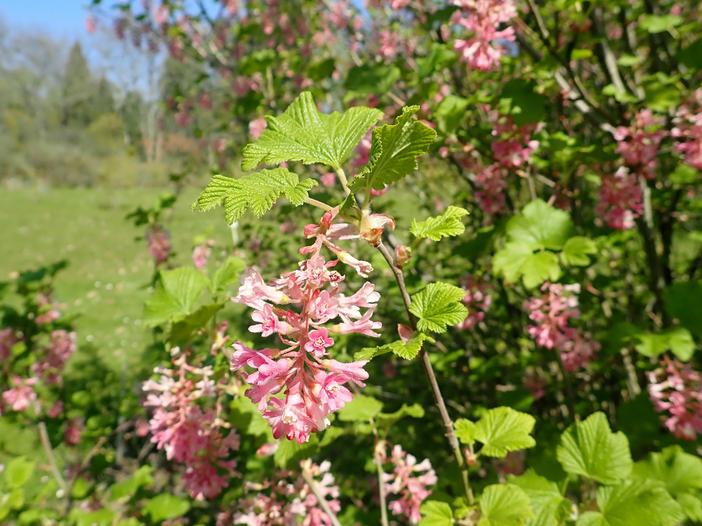Pink Flowering Currant
(Ribes sanguineum var. glutinosum)
Pink Flowering Currant (Ribes sanguineum var. glutinosum)
/
/

Salicyna
CC BY-SA 4.0
Image By:
Salicyna
Recorded By:
Copyright:
CC BY-SA 4.0
Copyright Notice:
Photo by: Salicyna | License Type: CC BY-SA 4.0 | License URL: https://creativecommons.org/licenses/by-sa/4.0 | Uploader: Salicyna | Publisher: Wikipedia Commons





























Estimated Native Range
Summary
Ribes sanguineum var. glutinosum, commonly known as Pink Flowering Currant, is a deciduous shrub native to the coastal chaparral and forest margins of California, particularly in the Coast Ranges. It typically grows up to 8 feet tall and wide, with a multi-stemmed, upright to spreading habit. The plant is known for its drooping clusters of pink to deep red flowers that bloom profusely in early spring, providing a striking display. The flowers are followed by dark purple, almost black, berries that are attractive to birds. The bark is smooth and reddish-brown, adding to the plant’s year-round interest.
Pink Flowering Currant is valued for its ornamental flowers and ability to attract pollinators, such as hummingbirds and butterflies, making it a popular choice for wildlife gardens. It is also used in restoration projects and as an understory plant in woodland gardens. This currant thrives in partial shade to full sun and requires moist, well-drained soils, though it is drought-tolerant once established. It is relatively low maintenance, but occasional pruning can help maintain its shape and promote vigorous growth. While generally disease-resistant, it can be susceptible to powdery mildew and rust in humid conditions.CC BY-SA 4.0
Pink Flowering Currant is valued for its ornamental flowers and ability to attract pollinators, such as hummingbirds and butterflies, making it a popular choice for wildlife gardens. It is also used in restoration projects and as an understory plant in woodland gardens. This currant thrives in partial shade to full sun and requires moist, well-drained soils, though it is drought-tolerant once established. It is relatively low maintenance, but occasional pruning can help maintain its shape and promote vigorous growth. While generally disease-resistant, it can be susceptible to powdery mildew and rust in humid conditions.CC BY-SA 4.0
Plant Description
- Plant Type: Shrub
- Height: 3-10 feet
- Width: 3-6 feet
- Growth Rate: Moderate
- Flower Color: Pink, White
- Flowering Season: Spring, Winter
- Leaf Retention: Deciduous
Growth Requirements
- Sun: Full Sun, Part Shade
- Water: Low
- Drainage: Fast, Medium
Common Uses
Bee Garden, Bird Garden, Butterfly Garden, Deer Resistant, Drought Tolerant, Low Maintenance, Showy Flowers, Street Planting
Natural Habitat
Coastal chaparral and forest margins of California, particularly in the Coast Ranges
Other Names
Common Names: Blood Currant , Pink-Flowered Currant , Chaparral Currant
Scientific Names: Ribes sanguineum var. glutinosum , Ribes albidum , Ribes glutinosum , Ribes glutinosum f. albidum , Ribes megalanthos , Ribes sanctae-luciae
GBIF Accepted Name: